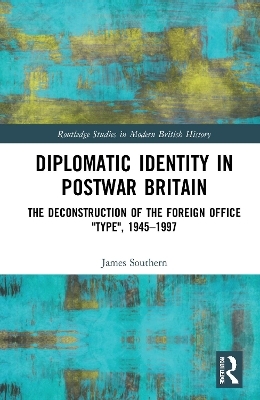
Diplomatic Identity in Postwar Britain
The Deconstruction of the Foreign Office "Type", 1945–1997
Seiten
2021
Routledge (Verlag)
978-0-367-45847-8 (ISBN)
Routledge (Verlag)
978-0-367-45847-8 (ISBN)
This book seeks to understand the cultural renegotiation of the "Foreign Office Type," the traditional archetype in which British diplomats had been recruited before developments in the twentieth century forced the Foreign Office to reconsider its template for an ideal British diplomat.
This book seeks to understand the complex ways in which the Foreign Office adapted to the rise of identity politics in Britain as it administered British foreign policy during the Cold War and the end of the British Empire. After the Second World War, cultural changes in British society forced a reconsideration of erstwhile diplomatic archetypes, as restricting recruitment to white, heterosexual, upper- or middle-class men gradually became less socially acceptable and less politically expedient.
After the advent of the tripartite school system and then mass university education, the Foreign Office had to consider recruiting candidates who were qualified but had not been ‘socialized’ in the public schools and Oxbridge. Similarly, the passage of the 1948 Nationality Act technically meant nonwhites were eligible to join. The rise of the gay rights movement and postwar women’s liberation both generated further, unique dilemmas for Foreign Office recruiters. Diplomatic Identity in Postwar Britain seeks to destabilize concepts like 'talent', 'merit', 'equality' and 'representation', arguing that these were contested ideas that were subject to political and cultural renegotiation and revision throughout the period in question.
This book seeks to understand the complex ways in which the Foreign Office adapted to the rise of identity politics in Britain as it administered British foreign policy during the Cold War and the end of the British Empire. After the Second World War, cultural changes in British society forced a reconsideration of erstwhile diplomatic archetypes, as restricting recruitment to white, heterosexual, upper- or middle-class men gradually became less socially acceptable and less politically expedient.
After the advent of the tripartite school system and then mass university education, the Foreign Office had to consider recruiting candidates who were qualified but had not been ‘socialized’ in the public schools and Oxbridge. Similarly, the passage of the 1948 Nationality Act technically meant nonwhites were eligible to join. The rise of the gay rights movement and postwar women’s liberation both generated further, unique dilemmas for Foreign Office recruiters. Diplomatic Identity in Postwar Britain seeks to destabilize concepts like 'talent', 'merit', 'equality' and 'representation', arguing that these were contested ideas that were subject to political and cultural renegotiation and revision throughout the period in question.
James Southern is a historical advisor to the UK Home Office.
Introduction: 'Member of' 1. Sir Percival Waterfield and the Civil Service Selection Board Experiment, 1945–1960 2. The Foreign Office and the Grammar School Revolution, 1945–1980 3. Redbrick, Whitehall: The Diplomatic Service 'Image' and University Expansion, 1960–1970 4. 'The Mystic Link between Colour and Security': Ethnicity and Recruitment to the Diplomatic Service, 1948–1993 5. 'No Homosexuals Allowed': The Diplomatic Service Bar on Homosexuality, 1965–1995 6. 'Safety First'?: Gender and the Lifting of the Foreign Office Marriage Bar, 1945–1975. Conclusion: 'Larger-than-Life Graham Greeneness'
| Erscheinungsdatum | 11.05.2021 |
|---|---|
| Reihe/Serie | Routledge Studies in Modern British History |
| Zusatzinfo | 1 Tables, black and white |
| Verlagsort | London |
| Sprache | englisch |
| Maße | 152 x 229 mm |
| Gewicht | 453 g |
| Themenwelt | Geschichte ► Allgemeine Geschichte ► Neuzeit (bis 1918) |
| Geisteswissenschaften ► Geschichte ► Regional- / Ländergeschichte | |
| Geschichte ► Teilgebiete der Geschichte ► Kulturgeschichte | |
| ISBN-10 | 0-367-45847-0 / 0367458470 |
| ISBN-13 | 978-0-367-45847-8 / 9780367458478 |
| Zustand | Neuware |
| Informationen gemäß Produktsicherheitsverordnung (GPSR) | |
| Haben Sie eine Frage zum Produkt? |
Mehr entdecken
aus dem Bereich
aus dem Bereich
Giordano Bruno - ein ketzerisches Leben
Buch | Hardcover (2024)
C.H.Beck (Verlag)
CHF 41,85
das dramatische 16. Jahrhundert
Buch | Hardcover (2024)
Rowohlt Berlin (Verlag)
CHF 47,60


